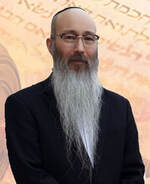|
By: HaRav Menashe Sasson Reporting from Jerusalem, Israel Published in the U.S.A. The Torah commands the observance of Sukkot, as follows: “And the Lord spoke to Moshe, saying, speak to the children of Yisra’el, saying, The fifteenth day of this seventh month [15 Tishrei] shall be the feast of booths for seven days to the Lord.” Vayyiqra 23:33-34. “You shall dwell in booths [for] seven days.” Id., at 23:42. The Torah explains that the requirement to observe Sukkot “shall be a statute for ever in your generations, Vayyiqra 23:41, and that the reason for observing Sukkot is so “that your generations may know that I made the children of Yisra’el dwell in booths when I brought them out of the land of Mizrayim [Egypt].” Id., at 23:43. The purpose of dwelling in booths – in Sukkot (pl.) [סוכות] (sukkah (singular) [סוכה]) – is to remind the Jewish people of their dependence on the will of HaShem. It was HaShem who took the Jewish people out of Mizrayim; it was HaShem who provided for the Jewish people during their travels in the desert; it was HaShem who gave the Jewish people the Torah and made them a nation; it was HaShem who took the Jewish people to Eretz Yisra’el (the Land of Israel); and it was HaShem who gave Eretz Yisra’el to the Jewish people. As we discussed in our writings on Parashat Ha’azinu, man cannot thwart the will of HaShem. See, The Short Road to Geulah. Geulah [גאולה] (Redemption) will come; however, the Torah has given us the choice of whether it will come quickly and easily, or slowly and with great difficulty. As things stand now, the Jewish people are on the “slow and with great difficulty” road to Geulah [גאולה]. Since 1948, when HaShem returned the Jewish people to their homeland, the Jewish people have continually been plagued by terrorist acts committed by resident Arabs. The result is that there are more anti-Semitic attacks committed against Jews in Eretz Yisra’el (Land of Israel) than there are in any other country. It should, although apparently does not, go without saying that something is seriously wrong when Jews, who are legally sovereign in their own land, and who have enacted a “Law of Return” which allows Jews from anywhere in the world to immigrate to Eretz Yisra’el, are injured and killed in Eretz Yisra’el – because they are Jewish – in greater numbers and at a higher rate per capita – than Jews in any other country in the world. The Jewish people were warned this might happen. From Parasha Ki Tissa, we learn that HaShem warned the Jewish people at Har Sinai, during the giving of the Torah, against entering into treaties which would allow those from whom the Land has been captured to remain in Eretz Yisra’el.
Shemot 34:11-17. In Parashat Mas’e, we learn that “HaShem spoke to Moshe in the plains of Moab, by the Yarden, near Yereho, saying, ‘Speak to the Children of Yisra’el and say to them: When you cross the Yarden [river and enter] into Eretz Kena’an, you shall drive out all of the inhabitants of the Land before you. . . .” Bamidbar 33:50-52. Likewise, in Parashat Shofetim, we are told that “But from the cities of these peoples that HaShem, you G-d gives you as an inheritance, you shall not allow any person to live. Rather, you shall utterly destroy them. . . .” Debarim 20:16-17. The Or HaHayyim wrote that:
Abarbanel, Commentary on Shemot 34:11-12. The solution to the problem is simple. Implementation of that solution, however, will be very difficult. The solution is that Medinat Yisra’el must abandon its non-Torah agenda and policies and begin following the Torah. Implementation of this solution will require, among other things, that Medinat Yisra’el convene a constitutional convention for the purpose of dissolving its current, non-Torah government and forming a new government through the adoption of a constitution (which it committed to doing in its 1948 declaration of independence). A comment made in 2007 by the esteemed American jurist Richard A. Poser, which is as valid now as it was then, states that: “Israel is an immature democracy, poorly governed; its political class is mediocre and corrupt; it floats precariously in a lethally hostile Muslim sea; and it really could use a constitution.” Richard A. Posner, “Enlightened Despot (reviewing Aharon Barak, The Judge in a Democracy (2006)),” New Republic, April 2007, at p.53. A Torah-based Constitution for Medinat Yisra’el would contain provisions such as:
Those who might erroneously believe that the above provisions are somehow arbitrary, capricious, or even racist, need only study and learn the appropriate provisions of Tanakh (Jewish Bible) and Halakha (Jewish law) to discover that these provisions are not only permitted, but are required by Halakha. This proposed course of action would, of course, guarantee outrage from the other nations, friend and foe alike. Many arguments can be made against this proposed course of action. The problem with each such argument, however, is that HaShem has commanded that the Jewish people govern themselves in accordance with Torah and not adopt to ways of the other nations. Thus, we see that the timeless message of Sukkot, and the reason for dwelling in a Sukkah for seven days each year, is to continually impress upon the Jewish people that they must – at all times and in all places – rely on HaShem, and not on other nations or other peoples, for their safety and security. חג סוכות שמח Hag Sukkot Sameah! Copyright © The Israel Foundation. All Rights Reserved.
0 Comments
Your comment will be posted after it is approved.
Leave a Reply. |
THE ISRAEL FOUNDATION





